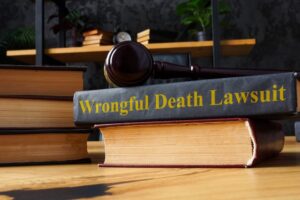The death of a loved one is always difficult, mentally and emotionally. You have to cope with the loss and learn to live without them. The pain of a loved one’s passing is further intensified when their death was preventable and caused by a third party.
If your loved one’s death happened at the hands of another, you may have the opportunity to file a wrongful death claim. But what is needed to prove a wrongful death? An experienced wrongful death lawyer can gather evidence, prove your loved one’s wrongful death, and get you the financial recovery you deserve.
What is “Wrongful Death?”
Simply put, a wrongful death occurs when another person knowingly or negligently causes a person’s death. Some of the common causes of wrongful death include:
- Vehicular collisions, including car, truck, and motorcycle accidents
- Pedestrian accidents
- Workplace accidents
- Construction accidents
- Defective products
- Medical malpractice
- Intentional acts of violence
Essentially, when a person dies wrongfully, their death could have been prevented had the third party acted with care to avoid the death or not acted with intent to cause the death.
Understanding Wrongful Death Cases
When you lose a loved one under wrongful circumstances, you can pursue monetary recovery by filing a wrongful death claim. Wrongful death cases fall under personal injury, or “tort,” law. This area of law allows victims to seek justice and compensation from the liable party.
Wrongful death cases are civil cases. In a civil case, the defendant would be “liable” – not “guilty” as they would be in a criminal case. Depending on the cause of the victim’s death, the at-fault party may also face criminal charges, for example, if the death is caused by drunk driving or murder.
Every state handles wrongful death claims differently based on state law. Therefore, it’s important to seek legal assistance from a qualified wrongful death lawyer to obtain the best outcome to your case.
Who Can File a Wrongful Death Claim?
Among essential wrongful death state laws, you’ll find the requirements for filing a wrongful death claim. The party entitled to file the claim depends on state procedure.
In some states, like Florida and New Jersey, wrongful death claims must be filed by the decedent’s personal representative. A personal representative is the person in charge of the decedent’s estate. They handle all matters, including distributing assets and paying off creditors. Additionally, personal representatives can file and handle lawsuits.
In other states, like Missouri and California, relatives of the victim can file a wrongful death claim. These parties include spouses, children, and parents.
It’s vital to determine who is entitled to file a wrongful death claim in your state. This person will work with the attorney to pursue financial recovery for the benefit of all interested parties.
Who Can Be Liable for a Wrongful Death?
Various people and parties can be held liable for a wrongful death. In many cases, only one person is responsible, but in others, more than one party can be liable.
Parties often found at fault for wrongful death include:
- Drivers
- Drivers’ employers
- Healthcare workers, including doctors and nurses
- Pharmacists
- Governmental entities
- Mechanics and repair companies
- Product designers, manufacturers, and distributors
It’s crucial to determine the cause of the victim’s death. This can provide answers as to who can be liable and who you can pursue compensation from.
The Burden of Proof in Wrongful Death Cases
A “burden of proof” is the standard that helps determine whether a legal claim is valid or invalid based on the evidence presented. Different burden of proof standards exist depending on the type of case. Usually, the party that brings the case holds the burden. Therefore, in a wrongful death claim, the plaintiff holds the burden of proof.
In a civil case, the plaintiff must prove their case “by a preponderance of the evidence.” Proving a case by a preponderance of the evidence means the evidence is enough to show that the plaintiff’s claim is more likely true than not true. So, in a wrongful death claim, you’re trying to prove that it is more likely true than not that the defendant caused your loved one’s death.
Proving a Wrongful Death
Proving your loved one died a wrongful death and another party was at fault can be challenging. What you need to prove to have a successful case depends on the circumstances, including what caused their death.
If the Death Was Caused by an Intentional Action
Some wrongful death cases are caused by intentional actions. When a defendant acts intentionally, it’s a deliberate act rather than an accident or negligence. If an intentional action causes another harm, it’s called an “intentional tort.”
To prove a wrongful death caused by an intentional tort, you must show that:
- The defendant engaged in an intentional act
- The victim died
- The victim’s death was caused by the defendant’s intentional act
Typically, when a wrongful death is caused by an intentional act, the defendant also faces criminal charges.
If the Death Was Caused by Negligence
Most wrongful deaths are the result of negligence. When a person acts negligently, it means they have failed to act reasonably, as one in another similar situation would have acted.
To prove a person acted negligently, therefore causing your loved one’s death, you must satisfy the four required elements of negligence: duty, breach, causation, and damages. If all four elements are successfully satisfied, you can prove your case and hold the responsible party liable for their wrongdoing.
The Defendant Owed Your Loved One a Duty of Care
First and foremost, you must start by showing the defendant owed your loved one a duty of care. A person’s duty of care varies depending on the time, place, and act involved.
For example, drivers owe others a duty of care to drive responsibly, and product manufacturers have a duty to make products safe for consumers.
The defendant must have owed your loved one a duty of care at the time of the incident.
The Defendant Breached their Duty of Care
Next, you must show the defendant’s action (or inaction) resulted in a breach of their duty of care. It’s important to consider what the defendant did or didn’t do to violate their duty.
For instance, a driver breaches their duty of care when they speed or run a stop sign. A product manufacturer breaches their duty of care when they make a product that is dangerous to consumers.
The Defendant’s Negligence Caused Your Loved One’s Death
After establishing duty and breach, you must exhibit the connection between the defendant’s wrongdoing and your loved one’s death. This means proving the defendant’s actions were the direct cause of the death, which can often be the most difficult element to prove.
The defendant may argue that there was an intervening factor that caused them to act in such a way, resulting in your loved one’s death. It’s necessary to evaluate the exact cause of your loved one’s death and provide sufficient evidence to prove that the defendant’s wrongdoing was, in fact, the actual cause of the death.
You Suffered Damages as a Result of Your Loved One’s Passing
It isn’t enough just to show the defendant caused your loved one’s death. You will also need to demonstrate that you suffered losses as a result of your loved one’s untimely passing.
Damages can be economic and non-economic. Your economic damages represent monetary, out-of-pocket expenses. Non-economic damages, on the other hand, concern your intangible losses.
If the Death Was Caused by Medical Malpractice
In a medical malpractice situation, a person is harmed or dies as a result of a healthcare provider’s wrongdoing. Generally, these cases fall under “negligence.” However, they can differ a bit, and some states handle claims caused by medical malpractice differently.
In a malpractice situation, instead of proving a breach of duty of care, you’ll have to show the defendant acted with a level of care that fell below the acceptable standard of care. In other words, the healthcare provider did not act in the manner a similarly situated medical professional would have acted.
Evidence Used to Help Prove Wrongful Death
Like in most other cases, evidence is critical in wrongful death claims. Strong evidence can significantly help you prove the defendant caused your loved one’s death.
Some of the evidence most often used in wrongful death claims include:
- Medical records
- Bills and invoices
- Witness statements
- Photos and videos
- Surveillance footage
- Police and accident reports
You can begin gathering evidence as soon as possible after your loved one’s death. Additionally, a wrongful death attorney can request and collect as much evidence as possible while building your case.
Damages Available in Wrongful Death Cases
As mentioned, one of the key parts of proving wrongful death caused by negligence is damages. Damages compensate you for the monetary and non-monetary losses stemming from your loss.
The damages you’re entitled to receive depend on the specifics of your case. Damages available for wrongful death claims include, but are not limited to:
- Funeral and burial costs
- Medical expenses your loved one incurred before their passing
- Loss of your loved one’s income and benefits
- Loss of inheritance
- Loss of services your loved one provided
- Loss of love, support, and companionship
Depending on the circumstances and your state’s laws, you may also be entitled to pursue punitive damages. Unlike compensatory damages, punitive damages don’t serve as compensation. Instead, they’re used to punish defendants for their grossly negligent, willful, or malicious actions.
Factors Influencing the Value of a Wrongful Death Claim
It can be difficult to wrap your mind around assigning a monetary value to your loved one’s life. Still, it is necessary to consider several details to determine how much your wrongful case is worth. Knowing the value of your claim can help ensure you get the compensation you deserve.
Your wrongful death attorney will assess the situation and consider numerous factors when calculating damages, including:
- The age and health of your loved one
- The cause of your loved one’s death
- The total cost of medical expenses incurred before your loved one’s passing
- Your loved one’s earning potential
- The family’s lost benefits
- Insurance policy limits
- Applicable damage caps
These and other pertinent details can aid your wrongful death lawyer in figuring out the true value of your claim.
Time Restrictions on Filing Wrongful Death Lawsuits
If your loved one died as a result of another party’s wrongdoing, you should take action as quickly as possible. Filing a lawsuit may not be at the forefront of your mind as you cope with the unexpected death of your loved one, but waiting too long can have a detrimental impact on your ability to recover monetarily for your loss.
The statute of limitations for wrongful death claims varies by state, but you may only have one to three years to file your case. While this may seem like enough time, time goes by rather quickly, and several steps usually come before filing a lawsuit. Working with a lawyer who is familiar with wrongful death law in your state can ensure that you meet all of the relevant filing dates and that your rights are protected.
A Skilled Wrongful Death Attorney Can Help You Prove Your Case
Wrongful death claims can be tough to handle. Not only are you dealing with your painful thoughts and feelings, but you also need to worry about your claim and doing everything possible to recover just compensation. Fortunately, you don’t have to do it alone.
A wrongful death lawyer understands the severity of your loss. They can provide the care, support, and kindness you need during one of the most trying times in a person’s life. Your wrongful death lawyer will protect your rights and handle your claim properly and efficiently to achieve the best possible case result.
When a loved one passes away wrongfully, don’t wait to seek legal guidance. Discuss your case with a personal injury attorney as soon as possible. Remember – waiting could jeopardize your right to obtain justice on behalf of your loved one.







